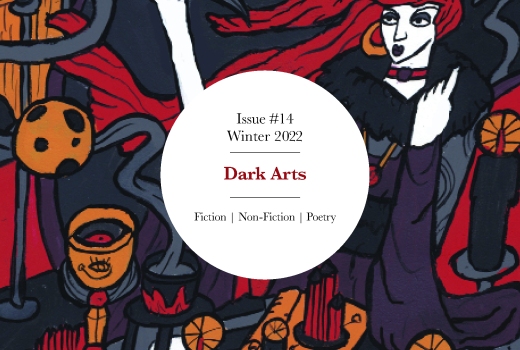The body is the house that we live in, whether it’s newly built or dilapidated, with sleek modern lines or sagging timbers. People might be content with the houses they inhabit, growing comfortable over the years in familiar rooms; others might be eager to embark on extensive renovations. We all hope to live in secure abodes but, without strong defences, their boundaries are sometimes breached.
Bodily contemplations inevitably revolve around fundamental milestones of birth and death, the physical dimension of love and the way we are perceived by others. Writers explore these themes and more in Shooter’s “On the Body” issue, our sixteenth edition of the magazine.
Nolcha Fox opens the issue with her whimsical poem “Skin”, delicately depicting the membrane between our outer and inner lives. Elizabeth Tannen and Ruth Lexton craft lyric insights into childbirth and early motherhood, while Natalie Moores and Harry Wilding offer wry verses on physical desire and its consequences. Steve Denehan also provides a humorous interlude on the subject of temporary tattoos. On the darker side of bodily experience, David Holper challenges the suggestion that “America Is Not a Racist Country”, and James McDermott closes the issue with two poignant poems about the death of his father from Covid-19.
In addition to the issue’s poetic nuts and bolts, the spring/summer edition features the winner of the 2022 Shooter Poetry Competition: Jenny’s Mitchell’s “Female Dedication”, which revolves around hardships experienced by the narrator’s mother and grandmother. Mitchell has previously won the Poetry Book Awards; her debut collection, Her Lost Language, was named a “Poetry Book for 2019” by Poetry Wales and her second collection, Map of a Plantation, is on the syllabus at Manchester Metropolitan University.
Many of the edition’s prose writers skilfully combine humour and acute observation in their responses to the theme. Sarah Archer weaves comedy out of the despair of ageing (to forty-one years old) in her story “Ripe”. April Farrant challenges sexism and double standards in her political piece, “Set Menu”, while Mark Keane mines the strange standards of the art world in “Exhibition”. Sage Tyrtle considers how far a makeover might go in “Up Next on The Repair Store”. A sinister threat emerges in Nathan Breakenridge’s “Full of Trees”, and Alison Milner connects the dots of loss in her moving flash fiction, “Constellation”.
Several pieces of non-fiction also punctuate the issue, all very different. Ona Marae, in “No Apology Here”, provides a powerful account of the assault she experienced as a teenager and the wider prevalence of sexual violence in society. Robin Hall recalls financially challenging times in his L.A. memoir “Dance Like Everyone Is Watching”, about his brush with male striptease. And in the most literal interpretation of “On the Body”, Sally Gander considers the significance of tattoo art in her essay “No Commitment Necessary”.
Whatever environment you inhabit – cosy apartment or sprawling manor, stylish penthouse or sparse yurt – I hope you will settle down cosily within that most important of edifices, your own skin, to enjoy this diverse and compelling edition of Shooter.
To order a copy of the On the Body issue, please visit the Subscriptions page.
The 2023 Short Story Competition and general submissions to do with The Unknown are open to entries until September 24.


